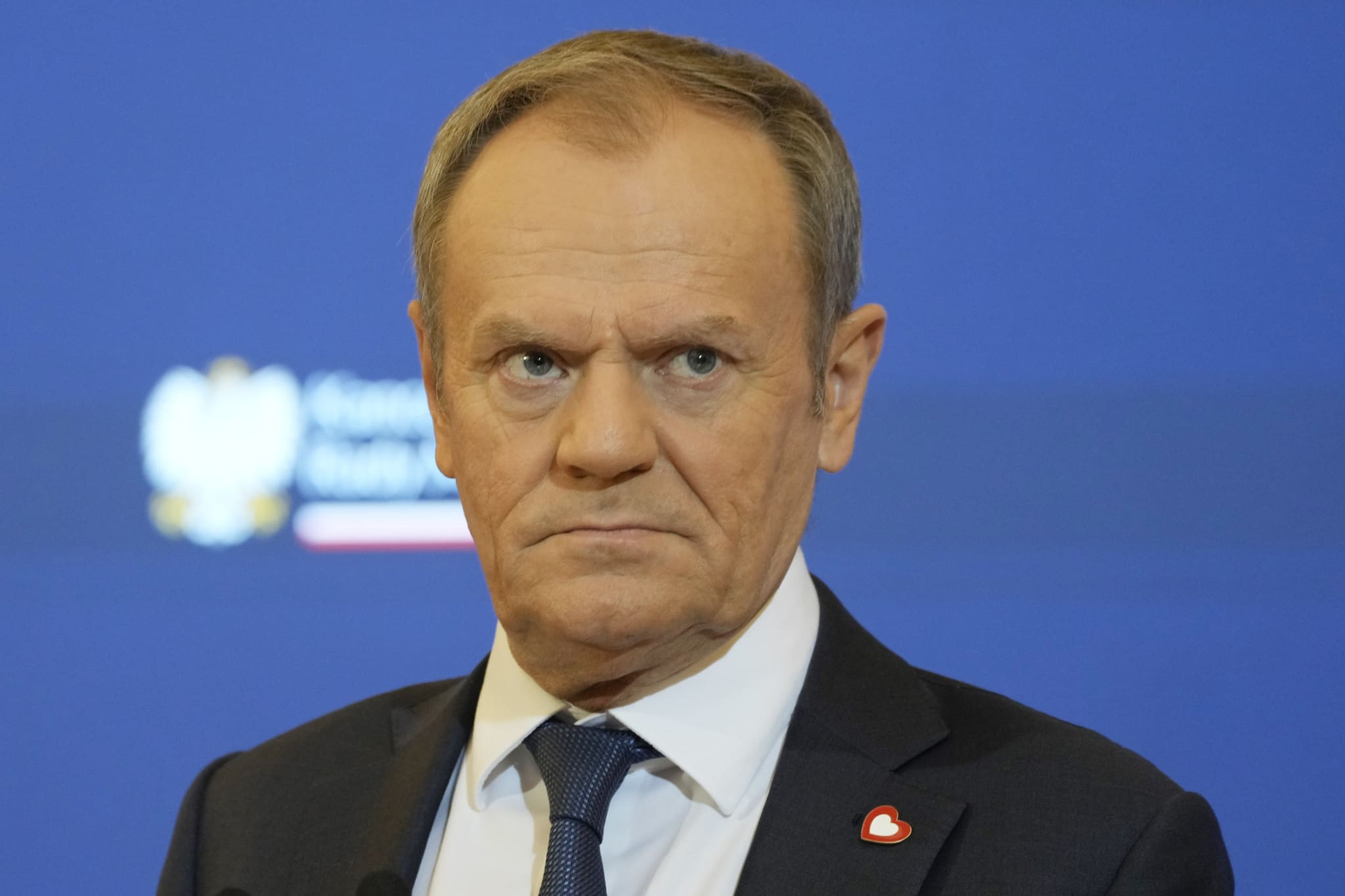With all the legal mess and competing directors claiming to be heading Polish public television TVP, one just needed to watch the evening news on TVP1 last week to realize who was now truly in charge.
On Thursday, for example, the news service’s first headline was dedicated to praising Culture Minister Barłomiej Sienkiewicz’s last move to put Poland’s public media in a state of liquidation. This decision was explained in a positive light only. After all, this is all the fault of President Andrzej Duda, who no longer wants Polish television TVP to be financed with public money now that it is not in the hands of the Law and Justice (PiS) party, according to TVP.
Prime Minister Donald Tusk was shown several times, in contrast to opposition leaders who did not appear once on air, and Tusk’s announcements were strongly supported by the commentators’ narrative.
The prime minister’s first big announcement was about a planned bill meant to introduce registered civil partnerships for gay and lesbian people, with TVP now pushing also for gay marriage and adoption for same-sex couples. His second announcement was about the funding of in vitro fertilization (IVF) by the state, with Law and Justice (PiS) now being criticized by TVP for having refused such funding.
Third came Tusk’s decision to suppress the Church Fund, a special fund financed from the state’s budget that dates back to the 1950s when it was created as a form of compensation for the Church properties seized by the communist regime. Today, it mostly finances the retirement pensions of priests and nuns, and its liquidation was a campaign promise made by Donald Tusk. Here too, nearly all the comments aired by TVP praised the new prime minister’s decision.
In short, Polish television now speaks with one voice, whether it is public TVP or the two big private groups, TVN and Polsat. This is a left-liberal voice favorable to the liberal government and hostile to its conservative opposition, just like in the years 2010-2015, after Donald Tusk’s previous government took control of public media, a situation that lasted until Law and Justice’s takeover at the beginning of 2016.
Truth be said, just like Donald Tusk’s Civic Platform (PO) from 2010 to 2015, Jarosław Kaczyński’s Law and Justice (PiS) treated the country’s public media as its propaganda tube as far as the news services and talk shows were concerned. Just as before, this was also reflected, to some extent, in the choice of programs that were produced and/or broadcast.
During the last eight years, however, as the long-time TVP talk show presenter Jan Pospieszalski told Remix News last week, “You could watch TVN to see what’s going on in the world, and then see what TVP says about it. And at least there were two different voices in the media.”
Now, the only dissenting voices will be that of two channels without the means and the financial powers of the big television companies: the small news channel TV Republika and the Catholic TV channel TV Trwam, which has a very decent daily news service but mainly focuses on religious content. Both are watched by a tiny proportion of television viewers compared to Poland’s big three, i.e., TVP, Polsat, and TVN groups.
It is worth noting that TV Trwam was allowed a slot on digital terrestrial television under Donald Tusk’s previous government in the early 2010s only after a long series of street protests in favor of media pluralism.
Even when it was decided that the authorities had to bow to such popular pressure, I personally know from someone close to the management of Poland’s Electronic Communication Office (UKE), the body in charge of signing the final documents before letting TV Trwam on digital terrestrial television, that there were clear instructions from the Tusk government to postpone the signing for as long as possible.
In 2010, during the presidential election campaign triggered by President Lech Kaczyński’s tragic death in Smolensk on April 10, movie producer Andrzej Wajda, who was a member of PO candidate Bronisław Komorowski’s campaign committee, famously said: “We need to find a way to turn to the head of public television. Why public television? Because it’s the only television that speaks to all Poles. Of course, we can have friends at TVN, and the second (private) television station may well support us, but (…) we must have our place assured on public television because what is not on television does not exist.”
At that time, TVP featured both liberal and conservative journalists and it did not act as the propaganda channel of any side. Its news service would criticize or praise both Tusk’s coalition made up of his own PO liberal party and the PSL agrarian party on the one side, and PiS, which was the main opposition party, just like today.
It was a few months after those words were said that the friends of Donald Tusk took control of Poland’s National Broadcasting Council (KRRiT). They did so by rejecting its annual report in the Sejm in order to force its members out. Tusk’s Civic Platform then shared the seats in the National Broadcasting Council with its PSL coalition ally and their post-communist left-wing opposition, i.e., the SLD party, which is now also part of Donald Tusk’s new governing coalition as part of the New Left alliance.
Following that move and the subsequent change in public media directors, almost all right-wing, conservative journalists were ousted from TVP and other public media in 2010-2011.
When the PiS-led United Right coalition won the October 2015 parliamentary elections and formed a government under Prime Minister Beata Szydło, an interview from Nov. 22, 2015, helped reveal the current state of the television networks at the time. On that date, the new Culture Minister Piotr Gliński appeared on TVP Info to discuss a play containing pornographic scenes presented at the city of Wrocław’s Teatr Polski, which is subsidized by the government. During his appearance, he was asked to explain why he had called for the performance to be banned, with the TVP Info journalist interviewing him constantly interrupting and attacking him. In fact, she did not allow him to freely express the stance of the new government on that subject.
So, PiS was under strong pressure from its electorate to quickly take control of the country’s public media. It did so, first, by voting in a new law on the media that took the power to appoint the public media’s directors away from the National Broadcasting Council in favor of the treasury minister. The public media’s managers were then quickly changed and their editorial line suddenly flipped from pro-PO, anti-PiS to pro-PiS, anti-PO.
This change was put to the Constitutional Tribunal who, in 2016, said it is unconstitutional to void the National Broadcasting Council of its functions and give the government the authority to directly appoint the public media’s manager. The National Broadcasting Council is a body mentioned in the Polish Constitution. The constitution does not state, however, what functions it should have apart from the general indication that it is the public media’s supervising body.
In the meantime, before the Constitutional Tribunal ruled on the matter, the PiS parliamentary majority had passed a new law on the media that led to the creation of a National Media Council. The latter was henceforth in charge of appointing the public media’s directors. This is the law that is still in force today. It has never been referred to the Constitutional Tribunal, so it has not been declared unconstitutional, apart from by Donald Tusk and his friends who have no legal authority to declare that a law is unconstitutional (although Tusk had indeed said during the election campaign that he would not apply the laws passed by parliament since 2016 that are in his opinion in violation of the constitution).
PiS was very strongly criticized at the time by its left-liberal opposition — as well as by the European Commission, the European Parliament, and the Western European mainstream media — for supposedly taking control of the media and suppressing media pluralism. However, PiS was acting according to the law — at least to the letter of the law, if not to its spirit, which is subject to diverging interpretations —following the legislative process provided for by the Polish Constitution.
When in control of Poland’s public media, Jarosław Kaczyński’s party did not foster freedom of expression and pluralism anymore than Donald Tusk’s party had done in the years 2010-2015, unfortunately. In some aspects, the situation even worsened. This was described by Jan Pospieszalski in his interview with Remix News mentioned above, and this is described as well on the dorzeczy.pl website by my colleague at the Do Rzeczy weekly, Łukasz Warzecha, a well-known right-wing journalist who has been very critical both of the Tusk government and the Morawiecki government:
“Before the new team took over [during the recent events], TVP Info was happy to recall several times a scene from 2015, when, during a program in which I participated together with Norbert Maliszewski, the presenter in charge, Jarosław Kulczycki, suggested that I was being paid by Andrzej Duda’s staff. I left the studio at the time. The problem is that, although the behavior of Mr. Kulczycki — who is now about to take over the management of the Panorama news service [on TVP2] — was scandalous, until that moment I was a regular guest on TVP Info, even if I presented views fundamentally different from those held by the authorities of the time. By contrast, when I upset the new authorities, I was blacklisted at TVP in 2017, and from then until now I have not appeared on TVP Info even once. This was never mentioned in the materials stigmatizing Kulczycki, though.”
Warzecha also reminds us of the ban put on two right-wing opposition media, the internet news channel wRealu24 and the weekly Najwyższy Czas by the PiS-controlled intelligence services, as well as of the dismissal of talk show presenter Jan Pospieszalski. The ban of Pospieszalski was called for by PiS politician Joanna Lichocka, who sits on the National Media Council, after Pospieszalski’s guests had criticized the public health and vaccination policy of Mateusz Morawiecki’s government during the Covid pandemic.
However, while both Tusk in 2010 and Kaczyński in 2016 acted in accordance with the letter of the law, Donald Tusk is now setting new standards, again, by openly breaking the law and the constitution in his brutal takeover of the public media.
As confirmed by the Constitutional Tribunal in 2016 (when it was still chaired by a PO appointee and not yet dominated by PiS appointees, as it is now), the Polish Constitution does not allow the government to appoint those who are in charge of managing public media in Poland. Furthermore, the media law that is currently in force (the one that was passed in 2016) clearly says that public media directors are appointed by the National Media Council. Just like PiS did in 2016 to change that, the current left-liberal majority would have to pass a new law, which it has not.
It has not even tried to, although in the current situation, President Duda, who, although himself a PiS politician, was sometimes critical of the propaganda tone in the public media under the Morawiecki government, could very well have been open to not vetoing a law that would have made public media more independent and pluralistic in Poland.
Instead of working on a new law, the Polish Sejm has just passed a simple resolution, i.e., an expression of its majority’s opinion which has no legal effect. However, both the culture minister and Justice Minister Adam Bodnar, who was vocal about the rule of law in recent years as the PO-appointed ombudsman, are adamant they are just putting in force the Sejm’s resolution.
Despite all the accusations about its supposed breaches of democratic values and the rule of law, during its eight years in power, PiS never violated the letter of Poland’s laws and constitution in such an open, blatant manner.
Interestingly, on the same day, when bewildered Poles saw the scenes of their public television being taken over with the help of private security agencies while its siege was encircled by police, the European Commissioner’s Vice President for Values and Transparency (whatever this means), Vera Jourová, who has been at the forefront of the battle against the previous government’s supposed breaches of the rule of law, was on a visit to the new government in Warsaw, and she had absolutely nothing to say about the events going on.
That tells us a lot about the real nature of this whole dispute on the rule of law between Brussels and Warsaw, as well as between Brussels and Budapest.
Even a leading SLD politician and a former prime minister, Leszek Miller, now acknowledges this openly, that the main milestone that had to be fulfilled by Poland to unlock the payment of NextGenerationEU recovery funds by the European Commission was… a change of government in Warsaw.
Jan Rokita, a former leading politician of Donald Tusk’s Civic Platform, has said about the new Tusk government’s methods:
“For the first time since regaining freedom [with the fall of communism in 1989-90], political conflict has blown the system’s fuses, so the power struggle is now spilling out chaotically and without brakes. Until now, it has always been the case that those who grabbed power put their trusted lawyers at work to concoct what laws could be used and which ones needed to be amended to hit their predecessors. This time, those now in power have come to the conclusion that such ‘formalism’ is an unnecessary bother, or a waste of time, when things can be done more quickly and simply.”
And it very much looks like Eurocrats are happy with their man in Warsaw violating the rule of law if this can help keep those evil populist, nationalist, homophobic PiS conservatives away from power for longer or — even better — forever.





